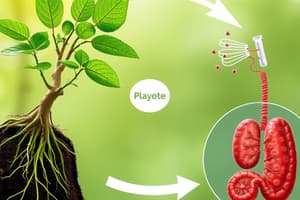Podcast
Questions and Answers
What is the main process through which plants produce glucose?
What is the main process through which plants produce glucose?
- Decomposition
- Photosynthesis (correct)
- Fermentation
- Cellular respiration
Where do animals get glucose from?
Where do animals get glucose from?
- From the air
- From their food (correct)
- From the ground
- From water
What happens to glucose during cellular respiration?
What happens to glucose during cellular respiration?
- It becomes carbon dioxide and water (correct)
- It becomes oil
- It becomes fat
- It becomes protein
Where can remains from plants and animals be stored for a long time without decomposing completely?
Where can remains from plants and animals be stored for a long time without decomposing completely?
What are coal, oil, and natural gas classified as?
What are coal, oil, and natural gas classified as?
What happens when fossil fuels are burned?
What happens when fossil fuels are burned?
What percentage of the Earth's water is salt water?
What percentage of the Earth's water is salt water?
Which of the following is NOT a form of precipitation mentioned in the water cycle?
Which of the following is NOT a form of precipitation mentioned in the water cycle?
What is the process by which water vapor in the atmosphere condenses into tiny droplets, forming clouds?
What is the process by which water vapor in the atmosphere condenses into tiny droplets, forming clouds?
If the Earth were shrunk to the size of an apple, how deep would the oceans be compared to the apple's skin?
If the Earth were shrunk to the size of an apple, how deep would the oceans be compared to the apple's skin?
What is the term used to describe the water that is not salt water?
What is the term used to describe the water that is not salt water?
Which of the following processes is NOT part of the water cycle?
Which of the following processes is NOT part of the water cycle?
What is the primary source of carbon atoms used by plants to produce glucose during photosynthesis?
What is the primary source of carbon atoms used by plants to produce glucose during photosynthesis?
What is the primary reason for the recent rapid increase in atmospheric carbon dioxide levels?
What is the primary reason for the recent rapid increase in atmospheric carbon dioxide levels?
Which of the following statements about Earth's water resources is true according to the text?
Which of the following statements about Earth's water resources is true according to the text?
What is the process by which decomposers, such as fungi and bacteria, contribute to the carbon cycle?
What is the process by which decomposers, such as fungi and bacteria, contribute to the carbon cycle?
Which of the following is NOT a fossil fuel mentioned in the text?
Which of the following is NOT a fossil fuel mentioned in the text?
What is the primary reason why some plant and animal remains do not decompose completely?
What is the primary reason why some plant and animal remains do not decompose completely?
Flashcards are hidden until you start studying
Study Notes
Carbon Cycle
- 0.039% of air is carbon dioxide.
- Carbon atoms from carbon dioxide are used by plants to produce glucose through photosynthesis.
- Glucose is used as fuel by cells in plants and animals through cellular respiration, producing carbon dioxide and water as byproducts.
- Carbon dioxide is returned to the air through cellular respiration and decomposition of dead plants and animals.
Fossil Fuels
- Dead plants and animals can be stored for long periods in places with limited oxygen, such as marshes and deep seabeds.
- Over time, these remains can become fossil fuels like coal, oil, and natural gas, which have been stored in the ground for millions of years.
- Burning fossil fuels releases a large amount of carbon dioxide into the air.
Water Cycle
- The water cycle, or hydrological cycle, is the continuous movement of water on, above, and below the Earth's surface.
- The cycle involves evaporation, condensation, precipitation, runoff, percolation, and surface storage.
- The water cycle is essential for distributing freshwater across the planet, sustaining life, and regulating climate patterns.
Water Facts
- If the Earth were the size of an apple, no ocean would be deeper than the apple's skin.
- 98% of the Earth's water is saltwater in the oceans, while 2% is freshwater.
- Most freshwater occurs as ice at the North and South Poles, with the rest forming lakes, rivers, and groundwater.
Nitrogen Cycle
- The nitrogen cycle is the process by which nitrogen is converted between its various chemical forms.
- The cycle involves nitrogen fixation, assimilation, ammonification, nitrification, and denitrification.
- Nitrogen is converted between atmospheric nitrogen, ammonia, nitrate ions, and other forms through the actions of bacteria, plants, and animals.
Studying That Suits You
Use AI to generate personalized quizzes and flashcards to suit your learning preferences.




